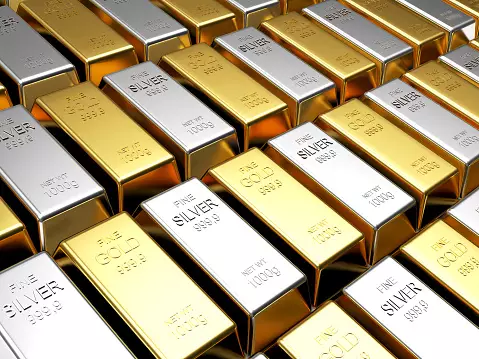In recent months, the precious metals market, particularly gold and silver, has witnessed extraordinary price movements, primarily driven by a confluence of global uncertainties and evolving economic conditions. As the U.S. dollar continues to gain strength, one might expect a corresponding dip in the demand for these metals. However, the reality presents a more complicated narrative. Coming against a backdrop of geopolitical tensions and a volatile economic outlook, the current surge in the prices of gold and silver reflects a deeper, multifaceted story that investors should carefully consider.
Gold’s Unyielding Ascent
Gold has recently experienced a significant surge, eclipsing the $2,750 mark, even as the U.S. dollar exhibits notable resilience. The ongoing demand for gold amidst rising dollar values raises questions about traditional market behaviors. Investors often view gold as a safe haven during turbulent times. Yet, with stock indices in the U.S. hitting high thresholds, one must ponder whether this trend signifies a mere speculation bubble or a grounded response to sustained global uncertainties.
Market participants appear to be positioning themselves for potential changes in U.S. leadership, with many speculating on the implications of a Trump presidency. Such political prospects are lending a unique lens through which to analyze current market behaviors—perception of stability, policy shifts, and economic strategies all intertwine to influence gold pricing. Importantly, the rise in gold prices offers a counter-narrative to what would ordinarily be expected in a robust dollar environment, signaling that factors beyond mere currency strength are at play.
While gold often garners the majority of investor attention, silver has emerged as a noteworthy counterpart in this scenario. Currently trading around $34, silver has been experiencing unprecedented gains, underpinned by its extensive applications in modern technology including electronics and renewable energy sectors. The demand for silver is expected to rise even further due to its essential role in these expanding industries. Moreover, the physical shortages in silver supplies present a compelling backdrop for its burgeoning price trajectory.
The relationship between supply and demand in the silver market appears decidedly unbalanced. Investors are keenly aware of this growing gap, with the stark contrast in these metrics acting as a fundamental driver for future gains. The prospect that silver prices could maintain or exceed recent highs seems increasingly plausible, particularly with analysts predicting continued demand growth as technological innovations evolve.
The U.S. dollar continues to feel upward pressure owing to positive economic indicators and shifting perspectives surrounding interest rate cuts. Recent comments from Federal Reserve policymakers reveal a predominately hawkish outlook, suggesting that the dollar could further strengthen. Market speculation regarding potential U.S. Treasury yield fluctuations adds yet another layer to the analysis of this currency’s trajectory.
Amid discussions of a “Trump trade” and its potential implications for monetary policy and economics, the dollar’s rise might be emblematic of larger market shifts anticipated around the upcoming U.S. elections. Investors are keenly analyzing these shifts, indicating that the U.S. dollar could sustain its ascent due to relatively fewer expected rate cuts compared to other leading central banks globally.
Technical Insights and Future Considerations
A look at gold’s technical indicators shows it lingering in overbought territory, which poses questions about the sustainability of its current valuation. Historical trends indicate that overbought conditions can persist significantly longer than anticipated—implying that the ongoing rally may yet have legs. Traders are now keeping a cautious eye on critical support levels, such as $2,739 and $2,714, while also eyeing resistance points, notably the psychological threshold of $2,775.
The interplay between gold and silver pricing amidst a rising dollar is indicative of broader economic and political conditions that investors must navigate delicately. The ongoing demand for both precious metals and their complicated relationship with currency fluctuations reflects the nuanced nature of modern investing. As market observers sift through these complex layers, it is evident that the future of gold and silver prices will remain a focal point for both investors and analysts alike.

